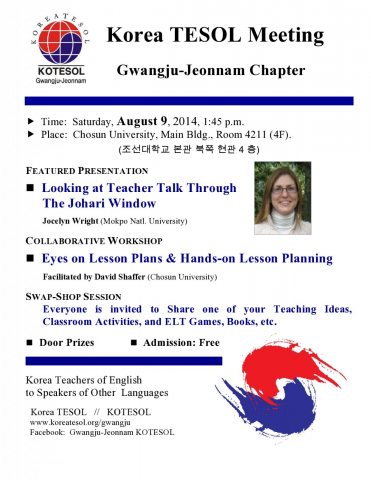
Gwangju-Jeonnam Chapter August Meeting
----- Morning Schedule -----
11:00-12:30: Reflective Practice Special Interest Group (RP-SIG) Meeting
Place: Starbucks, Chosun University Back Gate Branch
(Map: http://www.istarbucks.co.kr/store/store_view.asp?seq=593)
Session Topic: Critical Incidents (see below)
Session Facilitator: Jocelyn Wright
----- Main Meeting Schedule -----
Time: Saturday, August 9, 2014, 1:45 - 5:00 p.m.
Place: Chosun University Main Building (Gwangju), 4th Floor, Room 4211
1:45 pm: Sign-in and Meet-and-Greet (Admission is free. Future membership is welcomed.)
2:00 - 2:50 pm: PRESENTATION
Looking at Teacher Talk Through The Johari Window
Jocelyn Wright (Mokpo Natl. University)
2:50 - 3:10 pm: Refreshment Break
3:10 - 4:25 pm: Collaborative WORKSHOP
Eyes on Lesson Plans & Hands-on Lesson Planning
Dr. David Shaffer (Chosun University)
4:30 pm: Announcements / Drawing for Door Prizes / Closing
----- After-Meeting Evening Schedule -----
6:00 pm: After-meeting dinner at a downtown location (The First Alleyway).
[Downloadable poster at bottom of this web page.]
Presentation Abstracts and Presenter Information
1. Looking at Teacher Talk Through The Johari Window
By Jocelyn Wright
If you monitor your teacher talk or have the chance to observe other teachers around you and attend carefully to their speech, you might be surprised at what you hear! Even experienced teachers occasionally produce what is commonly referred to as semantic noise (Shannon & Weaver, 1949) in the field of communications. This kind of noise, which is most likely to be problematic if working with low-level learners, is essentially language that interferes with listener comprehension in an exchange.
Yet, to maximize language learning in communicative language classrooms, one key teaching goal should be to provide students with comprehensible input (Krashen, 1982). At the same time, another aim is to place learners at the center of activity and to get them producing the target language (Swain, 1985). To promote authentic language learning opportunities given often limited contact hours, teachers are, therefore, encouraged to focus both to the quality and quantity of their teacher talk.
Researchers have long argued that much classroom interaction, characterized by numerous pedagogical functions (e.g., explaining, commanding, questioning, modeling, giving feedback, etc.), does not genuinely reflect real-world communication. As such, improving on these aspects is essential.
In this workshop, we will focus on one common function: giving instructions. After doing a practice exercise, we will discuss what verbal and non-verbal characteristics contribute to their effectiveness. Then, with the aid of a peer observer, we will reflect on our output. To do this, we will primarily use a model called The Johari Window (Luft, 1969). This exploratory tool, originally designed for the development of interpersonal communication skills, lends itself well to collaborative reflective practice. A follow-up self-transcription proof-listening activity (adapted from Lynch, 2001) will also be proposed.
This three-step routine, consisting of simulation, interactive paired feedback, and more careful analysis is specifically intended to contribute to a greater awareness of teacher talk and provide new insights that will lead to improved classroom performance. More generally, though, it is hoped that these noticing and reflection techniques will be applied to ongoing professional development efforts and, possibly, future action research projects. [50-minute presentation]
References
Krashen, S. (1982). Principles and Practice in Second Language Acquisition. Oxford, England: Pergamon Press.
Luft, J. (1969). Of Human Interaction. Palo Alto, CA: National Press Books.
Lynch, T. (2001). Seeing what they meant: Transcribing as a route to noticing. ELT Journal, 55(2), 124-132.
Shannon, C. E., & Weaver, W. (1949). The Mathematical Theory of Communication. Urbana, IL: University of Illinois Press.
Swain, M. (1985). Communicative competence: Some roles of comprehensible input and output in its development. In S. Gass & C. Madden (Eds.), Input in Second Language Acquisition (pp. 235-253). Rowley, MA: Newbury House.
The Presenter
Jocelyn Wright works in the Department of English Language and Literature at Mokpo National University. She has an honor’s degree in linguistics, a master’s degree in education, and is also CELTA certified. Besides Korea, she has taught in Canada, the Dominican Republic, and France. Jocelyn actively serves KOTESOL, as both a Gwangju-Jeonnam Chapter officer and as a facilitator of the local Reflective Practice Special Interest Group (RP-SIG). These activities are in keeping with her keen interest in the areas of professional development and teacher training. Email: jocelynmnu@yahoo.com
________________________________________________
2. Eyes on Lesson Plans & Hands-on Lesson Planning
By David Shaffer
Following on the success of our June collaborative workshop (What Every EFL Teacher Should Know...), this collaborative workshop will first look briefly at lesson plans, what they may contain, and how they may be prepared. Next the group will be divided up into four small groups, each working on the preparation of a lesson plan for a different learner age group and different proficiency level. Each small group will be given the same topic for the lesson (comparatives) and must collaborate to put together an appropriate lesson plan for their learner level (elementary, grade 5; middle school, grade 2; high school, grade 2; university, sophomore). After each small group has completed preparation of their lesson, they will present it to the whole group for further analysis and discussion. In addition to providing an array of views on how a lesson can be devised, this workshop will show how the same language focus can be developed to be appropriate for different learner proficiency and age levels. [75-minute workshop]
The Presenter
David E. Shaffer (PhD Linguistics) is a long-time educator in Korea and long-time KOTESOL member. He is a professor at Chosun University, teaching English majors in the graduate and undergraduate programs. Dr. Shaffer is the author of several books on learning English as well as on Korean language, customs, and poetry. His present academic interests include professional development, and young learner and extensive reading research, as well as loanwords and effective teaching techniques. Within KOTESOL, Dr. Shaffer is presently National Publications Committee Chair, and a member of several committees, including the International and National Conference Committees, in addition to being Chapter president. He is the recipient of numerous KOTESOL awards and father of two KOTESOL members. Email: disin@chosun.ac.kr
More at: https://www.linkedin.com/profile/view?id=36126897&authType=name&authToke...
More at: https://www.academia.edu/DavidShaffer
_________________________________
--- Reflective Practice SIG Session ---
Critical Incidents
Facilitated by Jocelyn Wright
Life is full of twists and turns, and so is our teaching! Unplanned and unanticipated events in our lives and in our teaching affect us in notable ways and, if seen as significant, can lead to important and interesting changes in our practice. In our August RP meeting, we will try to reflect back on some of these critical incidents and discuss how they have shaped and continue to influence us and the decisions we make as teachers.
Download poster at bottom of web page.

| Attachment | Size |
|---|---|
| 99.76 KB |


